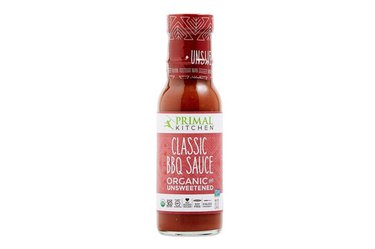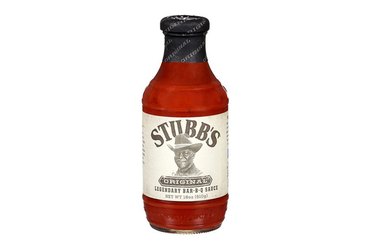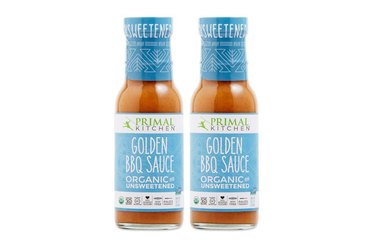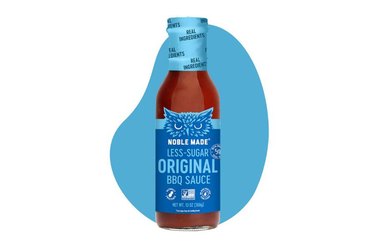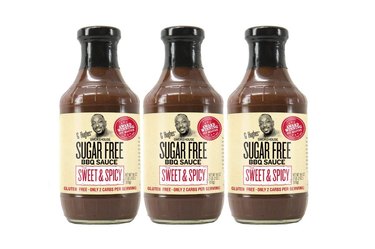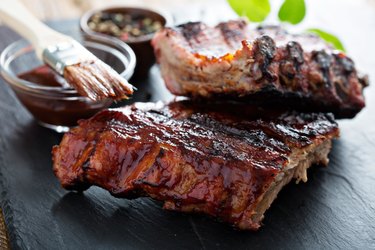
At its core, barbecue sauce is a combo of tomatoes and vinegar. Add some spices and smokiness, and you've got yourself a complex medley of flavors that pair well with meat, beans and even pizza. But what should be a simple recipe becomes long and complicated at the grocery store.
Many store-bought varieties of barbecue sauce are loaded with ingredients, such as high-fructose corn syrup, that are best enjoyed in moderation. While most are especially high in sugar, some are also high in calories and sodium.
Video of the Day
Video of the Day
But this doesn't mean you have to give up your favorite summertime condiment. "While barbecue sauce isn't exactly a 'health food,' some are healthier than others," says Jenna Volpe, RDN, a registered dietitian based in Austin, Texas. "It all depends on the ingredients and serving size."
To find the healthiest barbecue sauces on the market, we asked registered dietitians for their top picks — and brands they'd recommend avoiding altogether. Here's how you can still enjoy the smoky flavors with better-for-you ingredients.
Top 5 Healthiest Barbecue Sauces
- Primal Kitchen Classic BBQ Sauce, Organic & Unsweetened (From $19.38, Amazon)
- Stubb's Original BBQ Sauce (From $14.72, Amazon)
- Primal Kitchen Golden BBQ Sauce, Organic & Unsweetened (From $18.50, Amazon)
- Noble Made Classic BBQ Sauce (From $8.45, Noble Made)
- G. Hughes Sugar-Free BBQ Sauce ($3.88, Walmart)
How We Chose
We spoke to registered dietitians to find the healthiest barbecue sauces and what to look for at the grocery store. Then, we analyzed the nutrition facts and ingredients of dozens of popular barbecue sauces to find the most nutritious options.
Per dietitian recommendations, the following barbecue sauces contain fewer than 40 calories, 2 grams of fat, 320 milligrams of sodium and 6 grams of sugar (and 5 grams of added sugar) per 2-tablespoon serving.
Tip
Added sugars can add up quickly, and eating too much can contribute to weight gain, obesity, type 2 diabetes and heart disease, according to the Centers for Disease Control and Prevention (CDC). This is why added sugars should be limited to less than 10 percent of your total calories, per the 2020-2025 USDA Dietary Guidelines for Americans.
1. Primal Kitchen Classic BBQ Sauce, Organic & Unsweetened
Per serving (2 tablespoons): 15 calories, 0 grams fat, 160 milligrams sodium, 3 grams carbohydrates (<1 grams fiber, 2 grams sugar, 0 grams added sugar), 0 grams protein
If you're looking for a healthy barbecue sauce with simple ingredients you recognize, Primal Kitchen may be the brand for you. It's the brand most recommended by our dietitians, who like that the classic version has no added sugar, unlike most conventional brands.
"Primal Kitchen is one of my favorite brands of barbecue sauce because it only uses natural, organic and whole-food ingredients," Volpe says. Each serving contains 2 grams of natural sugar, but it doesn't have (or need) any additional sweeteners.
"It has 160 milligrams of sodium per serving, which is significantly less than other brands," says Samantha Cassetty, RD, a registered dietitian in New York City.
Buy it: Amazon ($19.38 per 2-pack); Primal Kitchen ($6.49 per bottle)
2. Stubb's Original BBQ Sauce
Per serving (2 tablespoons): 30 calories, 0 grams fat, 250 milligrams sodium, 7 grams carbohydrates (5 grams sugar, 4 grams added sugar), 0 grams protein
Looking for a classic barbecue sauce brand that's still lower in sugar than other options? Try Stubb's. Our dietitians like this pick because it's a reliable brand that's found in many grocery stores.
"This is my go-to mainstream brand," Cassetty says. "It delivers a classic barbecue flavor without being cloyingly sweet." Sure, it still has 4 grams of added sugars, but this is still less than half of what some other brands are packing. The sweetness comes from molasses and brown sugar, but the first ingredient is tomato puree and it's free of high-fructose corn syrup.
Volpe also likes this brand for people with certain dietary restrictions. "Stubb's is a gluten-free barbecue sauce, so it's an allergen-friendly option for people with celiac disease or non-celiac wheat sensitivity," she says, adding that it's also free of soy.
3. Primal Kitchen Golden BBQ Sauce, Organic & Unsweetened
Per serving (2 tablespoons): 15 calories, 0 grams fat (0 grams saturated fat), 300 milligrams sodium, 2 grams carbohydrates (0 grams fiber, 1 grams sugar, 0 grams added sugar), <1 gram protein
There are many varieties of barbecue sauce, and taste preferences can vary by region. Primal Kitchen's Golden BBQ Sauce is Carolina-inspired and has a sour, tangier taste. It's also a dietitian-approved pick for its low sugar content, which comes from natural sources of sugar.
"People watching their blood sugar might like the no-added-sugar variations of barbecue sauce by Primal Kitchen," Volpe says. "Its other variations, such as its Golden BBQ Sauce, are also sweetened only with natural, unrefined sugars."
Swapping your high-sugar barbecue sauce for one that's free of added sugars, such as this one by Primal Kitchen, is a simple but flavorful way to cut back on unnecessary sugars.
Buy it: Amazon ($18.50 per 2-pack); Primal Kitchen ($6.49 per bottle)
4. Noble Made Classic BBQ Sauce
Per serving (2 tablespoons): 20 calories, 0 grams fat (0 grams saturated fat), 310 milligrams sodium, 4 grams carbohydrates (0 grams fiber, 3 grams sugar, 2 grams added sugar), 0 grams protein
This pick is sweetened with fruit juice from apples and pineapples, so even though it contains much less sugar than leading brands, it's not missing the sweetness that's key to a good barbecue sauce.
"Noble Made Classic BBQ Sauce has a tangy-smoky flavor with just 2 grams of added sugar, which is a stand-out in the category," Cassetty says. "I've used this at home, so I can confirm it's kid-approved, too."
Its second ingredient is apple cider vinegar, which is linked to better total cholesterol and blood lipid levels, according to a June 2021 meta-analysis in BMC Complementary Medicine and Therapies. Lipid panels are helpful measurements of heart health and can diagnose medical conditions such as heart disease, per the Cleveland Clinic. So, this ACV-infused barbecue sauce may be a great addition to a heart-healthy lifestyle.
It's also low in calories, gluten-free and keto- and paleo-friendly, so it's suitable for a variety of meal plans.
Buy it: Noble Made ($8.45 per bottle); Amazon ($13.60)
5. G. Hughes Sugar-Free BBQ Sauce
Per serving (2 tablespoons): 10 calories, 0 grams fat, 200 milligrams sodium, 2 grams carbohydrates (0 grams fiber, 0 grams sugar), 0 grams protein
G. Hughes is a sound choice for those looking for a zero-sugar and low-sodium barbecue sauce (it has just 200 milligrams of sodium, or 9 percent of your daily value). This pick's first two ingredients are tomatoes and apple cider vinegar.
A 2-tablespoon serving has just 10 calories, but note that it does contain sucralose, so if you're avoiding artificial sweeteners, this pick might not be for you.
Barbecue Sauces to Avoid
When shopping for a healthy barbecue sauce, our dietitians say to get to know the labels and ingredient lists.
Avoid sweeteners like high-fructose corn syrup and artificial sweeteners, and avoid brands that are high in sugar and sodium. Barbecue sauces are more likely to be high in added sugar than sodium, so Cassetty says to cap the added sugar to no more than 6 grams per 2 tablespoons of barbecue sauce.
Based on dietitian input, the following brands don't make the cut:
- Kraft
- Sweet Baby Ray's
- Jack Daniel's
- Heinz
What to Look For Before Buying
Low in Added Sugar
Our dietitians' number one piece of advice? Peep the sugar content. Barbecue sauce brands are notorious for adding sugar instead of relying on natural sugar from fruits and vegetables.
"Barbecue sauce can be a healthy way to add flavor to food, but you have to watch out for added sugars, which can be through the roof," Cassetty says. "For example, one popular brand of barbecue sauce has 17 grams of added sugar per 2-tablespoon serving — the equivalent of about five [small] chocolate chip cookies!"
Added sugars are OK in moderation, but they only contribute calories from sugar to your diet, so it's best to reserve your calories for foods that are good sources of essential nutrients (such as fruits, vegetables and lean proteins), according to the American Heart Association (AHA).
Low in Sodium
An estimated 90 percent of Americans get too much sodium in their diets, per the CDC. A high-sodium diet can elevate your blood pressure levels, which can increase the risk of heart disease and stroke. So, try to be mindful of the sodium level in sauces and condiments that you could easily eat a lot of.
A single serving of barbecue sauce can contain up to 20 percent of your daily sodium allowance, and the salt will add up the more you use, Cassetty says.
Adults should aim for no more than 2,300 milligrams of sodium per day and even less for those with high blood pressure, according to the AHA.
Ideally, a low-sodium barbecue sauce should have 140 milligrams of sodium or less per serving, but this is hard to find on shelves unless you make it yourself. Our dietitian-approved barbecue sauces range from 160 to 310 milligrams of sodium per serving.
Free of Alternative Sweeteners
A little sweetness is a requirement of a good barbecue sauce, and the best sweeteners are fruits and vegetables.
"Make sure the brand is using less sugar overall and not replacing cane sugar with alternative sweeteners, such as sucralose, which have been associated with poor health outcomes," Cassetty says.
To keep added sugar levels low, some barbecue sauces rely on alternative sweeteners like high-fructose corn syrup and artificial sweeteners, but these are linked to bad gut health, per the Mayo Clinic. For this reason, Volpe generally recommends avoiding condiments sweetened with aspartame, saccharin or sucralose
Cassetty recommends barbecue sauce brands that sweeten condiments with fruit juice concentrates, molasses and brown sugar.
"If a barbeque sauce is only eaten once in a while — even if it isn't the healthiest — enjoying barbeque sauce occasionally in small quantities likely won't make a difference in long-term health outcomes for most generally healthy people," Volpe says.
- USDA: “2020-2025 Dietary Guidelines for Americans”
- BMC Complementary Medicine and Therapies: "The effect of apple cider vinegar on lipid profiles and glycemic parameters: a systematic review and meta-analysis of randomized clinical trials"
- Cleveland Clinic: "Lipid Panel"
- Harvard Medical School: "Barbecue better for Labor Day"
- Cleveland Clinic: "Avoid the Hidden Dangers of High Fructose Corn Syrup"
- American Heart Association: "Sugar 101"
- CDC: "Sodium"
- American Heart Association: "Shaking the Salt Habit to Lower High Blood Pressure"
Was this article helpful?
150 Characters Max
0/150
Thank you for sharing!
Thank you for your feedback!
